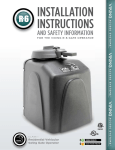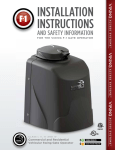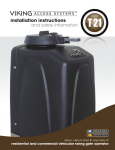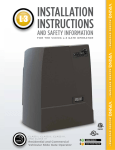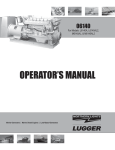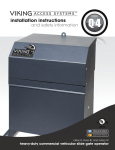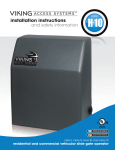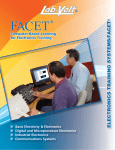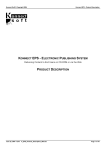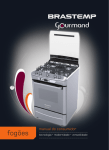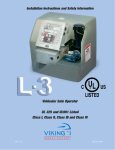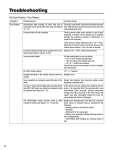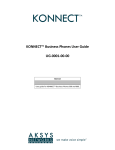Download R-6 Solar™ Installation Manual
Transcript
INSTALLATION INSTRUCTIONS AND SAFETY INFORMATION F O R T H E V I K I N G R - 6 S G AT E O P E R ATO R CLASS I Residential Vehicular Swing Gate Operator The R-6S™ Viking Solar Swing Gate Operator is capable of handling gates up to 700 lbs. and 14 ft. long. With its efficient drivetrain, built in solar regulator, VFlex control board and Viking Solar Power Management Systems; the R-6S™ Gate Operator is the ideal choice for any solar residential applications. THE VIKING R-6S™ SWING GATE OPERATOR R-6s Solar Vehicular Gate Operator • Revision SR6MN10.B • May 2015 VIKING TECHNICAL SUPPORT 1.800.908.0884 1 PARTS DIAGRAM: Item Description 2 Part No. 1 Operator Cover Bolt (4) VASWCB 2 Operator Cover VAR6CO20 3 Output Shaft Knob DWOUK10 4 Output Shaft Cover DWOC20 5 Clutch Key VAWRCK20 6 Clutch and Handle DWCL20 7 Output Arm DWAR20 8 Output Shaft R6OPS20 9 Limit Cam & Holder DWLC10 10 Limit Switch (2) DULS10 11 Limit Switch Holder DWLH10 12 Solar Control Board VSPCB 13 Fuse - 15 amp VNXF15A 14 Fuse - 4 amp VNXF4A 15 Worm Gear #60 Ratio 30:1 R6GB60 16 Alarm DUAL10 17 Solar Terminal Block Assembly VSTBASW 18 Solar Battery Breaker VASBB25 19 Solar Panel Switch DUMRS5 20 Solar Charger VSCHARGSW 21 Motor Switch DUMRS10 22 Power Switch DUMRS10 23 Chassis VSR6CH 24 Sprocket (Gearbox) VASP1034 25 Chain #40x38 Pitches R6CHN40 26 Sprocket (Motor) VASP1058 27 24V DC Gearhead Motor VSR6MO 28 Brush Kit VAMBK 29 Multi-Part Arm Assembly VA-F1ARM20 30 Limit Switch Harness VNXR6LSH VIKING TECHNICAL SUPPORT 1.800.908.0884 OPERATOR REFERENCES: 1. COVER BOLTS 2. OUTPUT SHAFT COVER (HAT) 3. OUTPUT SHAFT KNOB secures Hat; remove to access manual release 8. SOLAR CONTROL BOARD 9. MOTOR SWITCH discontinues power to the motor; also serves as a breaker that will self-trip to protect the motor circuitry 4. MAIN COVER ASSEMBLY 5. MANUAL RELEASE HANDLE releases the clutch to allow for manual operation 10.POWER SWITCH discontinues all power to the control board 11. SOLAR TERMINAL BLOCK ASSEMBLY 6. CLUTCH KEY connections for solar panels and battery install if application does not require clutch to slip; 12.SOLAR CHARGER remove to manually operate the gate regulates and distributes solar power 7. OUTPUT ARM connects the Arm Assembly to Clutch & Handle Assembly VIKING TECHNICAL SUPPORT 1.800.908.0884 3 CONTROL BOARD REFERENCES: 1. POWER HARNESS CONNECTOR provides power to the control board. pg 20 2. “OPEN LEFT” & “OPEN RIGHT” provides power to the motor. pg 21 3. LIMIT SETUP BUTTONS available for future developments. 4. FEATURE ACTIVATION TRIM POTS activate and set features. pg 24 5. “EPS1” CONNECTOR communication for Viking Solar Charger. 6. “EPS2” CONNECTOR available for future developments. 7. “EMI” CONNECTOR not applicable to this model. 8. “CHECK MOTOR” Status LED indicates motor power status. pg 36 9. “BATTERY LOW” Status LED indicates battery power status. pg 36 10. “POWER” Status LED control board power status. pg 36 4 11. “MAGNETIC LOCK RELAY” Status LED status of this on-board relay. pg 36 21. “DIAGNOSE” Button allows you to navigate through the Diagnostics LCD Display. pg 38-40 12. “MAGNETIC LOCK RELAY” Terminal Block 22. “DIAGNOSE” LED connect electric locks here. pg 36 informs that errors have been detected 13. INPUT STATUS LEDs and available on LCD Display. pg 38-40 indicates input status. pg 36-37 23. LCD DIAGNOSTICS DISPLAY 14. ACCESS CONTROL TERMINAL BLOCKS provides error messages, diagnostics accessory connections. pg 29-32, 42-44 and operator status information. pg 38-40 15. “MASTER/SLAVE” Terminal Block wired master/slave connection. pg 23 24. EXPANSION PRODUCT CONNECTIONS connections for additional products 16. CONTROL BOARD MOUNTING HOLES from Viking Access Systems. pg 46 secures and grounds the control board. 25. “FAIL SAFE/SECURE” Jumper 17. “Siren” TERMINAL BLOCK power failure option. pg 25 Vikings UL Siren is connected here. 26. FUSE HOLDER - 15 AMP 18. ON-BOARD 3 BUTTON STATION for motor circuit. controls the gate during set up. 27. FUSE HOLDER - 4 AMP 19. “AUX. PWR” Terminal Block not applicable to this model. used for solar applications & in-motion warning devices. pg 20, 25 28. HEAT SINK secures the control board and 20.FEATURE ACTIVATION PIN HEADERS dissipates heat. activate features by placing a jumper onto the pin headers. pg 25 VIKING TECHNICAL SUPPORT 1.800.908.0884 TABLE OF CONTENTS: PARTS DIAGRAM/PARTS LIST OPERATOR REFERENCES CONTROL BOARD REFERENCES IMPORTANT SAFETY INFORMATION Important Safety Instructions Important Installation Instructions Maintenance General Safety Precautions Operator Classification Photo Beam (non-contact sensor) Installation Edge Sensor (contact sensor) Installation Manual Release Audible Alarm Reset Installation Warning Placard Installation IMPORTANT INSTALLATION INFORMATION Specifications GATE OPERATOR INSTALLATION 2 3 4 6-12 6 7 8 8-9 9 10 11 11 12 12 13 13 14-17 Concrete Pad Option Post Mounting Option Operator Positioning 14 15 16-17 ELECTRICAL INSTALLATION 18-20 Battery & Solar Panel Selection Solar Panel Care & Installation Tips Solar Connection & Power Saving Tips LIMITS SETUP MASTER/SLAVE SET UP CONTROL BOARD SETUP Initial Settings Obstruction Detection Sensor (Primary Entrapment Protection) ACCESSORY CONNECTIONS Re-Open Photo Beam (Vehicular Safety) Radio Receiver (Typical) Anti-Tail Gate, Open Commands, Guard Station Viking Loop Rack Guidelines for Loop Installations Blank Page Barrier Arm (B-12) Synchronization Option TROUBLESHOOTING 18 19 20 21-22 23 24-26 24-25 26 29-35 29 30 31 32 33 34 35 36-41 LED References LCD Display References Solutions 38-40 APPENDIX A & B VIKING EXPANSION PRODUCTS 42-44 45 VIKING TECHNICAL SUPPORT 1.800.908.0884 36-37 41 5 IMPORTANT SAFETY INFORMATION ! WARNING! Not Following these instructions may cause severe injury or death. IMPORTANT SAFETY INSTRUCTIONS ! WARNING! To reduce the risk of severe injury or death. 1. READ AND FOLLOW ALL INSTRUCTIONS . 2. Never let children operate or play with gate controls. Keep the remote away from children. 3. Always keep people and objects away from the gate. NO ONE SHOULD CROSS THE PATH OF THE MOVING GATE. 4. Test the gate operator monthly. The gate MUST reverse on contact with a rigid object or when an object activates the non-contact sensors. Af ter adjusting the force or the limit travel, retest the gate operator. Failure to adjust and retest the gate operator properly can increase the risk of injury or death. 5. Use the emergency release only when the gate is not moving. 6. KEEP GATES PROPERLY MAINTAINED. Read the user’s manual. Have a qualified service person make repairs to gate hardware. 7. The entrance is for vehicles only. Pedestrians must use a separate entrance. 8. Every gate operator installation MUST have secondary protection devices against entrapment, such as edge sensors and photo beams more in particularly in places where the risk of entrapment is more likely to occur. 9. SAVE THESE INSTRUCTIONS . IMPORTANT INSTALLATION INSTRUCTIONS 1. Install the gate operator only when: a. The operator is appropriate for the construction of the gate and usage Class of the gate (refer to page 9), b. All openings of a horizontal slide gate are guarded or screened from the bottom of the gate to a minimum of 6 feet (1. 83 m) above the ground to prevent a 2-1/4 inch (57. 2 mm) diameter sphere from passing through the openings anywhere in the gate, and in that portion of the adjacent fence that the gate covers in the open position, c. ALL EXPOSED PINCH POINTS ARE ELIMINATED OR GUARDED, AND d. GUARDING IS SUPPLIED FOR EXPOSED ROLLERS . 2. The Operator is intended for installation only on gates used for vehicles. Pedestrians must be supplied with a separate access opening. The pedestrian access opening shall be designed to promote pedestrian usage. Locate the gate such that persons will not come into contact with the vehicular gate during the entire path of travel of the vehicular gate. 3. The gate must be installed in a location so that enough clearance is supplied between the gate and adjacent structures when opening and closing to reduce the risk of entrapment. Swinging gates shall not open in to the public access areas. 4. The gate must be properly installed and work freely in both directions prior to the installation of the gate operator. Do not over-tighten the operator clutch or pressure relief valve to compensate for a damaged gate. 5. The gate operator controls must be placed so that the user has full view of the gate area when the gate is moving AND AWAY FROM THE GATE PATH PERIMETER. 6 VIKING TECHNICAL SUPPORT 1.800.908.0884 IMPORTANT SAFETY INFORMATION ! WARNING! Not Following these instructions may cause severe injury or death. IMPORTANT INSTALLATION INSTRUCTIONS (Continued) 6. Controls intended for user activation must be located at least six feet (6’) away from any moving part of the gate and where the user is prevented from reaching over, under, around or through the gate to operate the controls. Exception: Emergency access controls only accessible by authorized personnel (i.e. fire, police, EMS) may be placed at any location in the line-of-sight of the gate. 7. The Stop and/or Reset button must be located in the line-of-sight of the gate. Activation of the reset control shall not cause the operator to start. 8. A minimum of two (2) WARNING SIGNS shall be installed, one on each side of the gate where easily visible. 9. For gate operators using non-contact sensors (Photo Beams or like) in accordance with section 31.1.1 of the UL standard: a. See instructions on the placement of non-contact sensors for each type of application (refer to page 10). b. Care shall be exercised to reduce the risk of nuisance tripping, such as when a vehicle, trips the sensor while the gate is still moving, and c. One or more non-contact sensors shall be located where the risk of entrapment or obstruction exists, such as the perimeter reachable by a moving gate or barrier (refer to page 10). d. Use only Omron E3K-R10K4 photoelectric eye to comply with UL 325 10.For a gate operator utilizing a contact sensor (Edge sensor or like) in accordance with section 31.1.1 of the UL 325 standard: a. One or more contact sensors shall be located where the risk of entrapment or obstruction exists, such as a the leading edge, trailing edge, and post mounted both inside and outside of a vehicular horizontal slide gate. b. One or more contact sensors shall be located at the bottom of a vehicular vertical lif t gate. c. One or more contact sensors shall be located at the pinch point of a vehicular vertical pivot gate. d. A hardwired contact sensor shall be located and its wiring arranged so that the communication between the sensor and the gate operator is not subject to mechanical damage. e. A wireless contact sensor such as one that transmits radio frequency (RF) signals to the gate operator for entrapment protection functions shall be located where the transmission of the signals are not obstructed or impeded by building structures, natural landscaping or similar obstructions. A wireless contact sensor shall function under the intended end-use conditions. f. One or more contact sensors shall be located on the inside and outside leading edge of a swing gate. Additionally, if the bottom edge of a swing gate is greater than 6 inches (152 mm) above the ground at any point in its arc of travel, one or more contact sensors shall be located at the bottom edge (refer to page 11). g. One or more contact sensors shall be located at the bottom edge of a vertical barrier (arm). h. Only Use Miller Edge Model MGR20 or MGS20 edge sensor to comply with UL325. VIKING TECHNICAL SUPPORT 1.800.908.0884 7 IMPORTANT SAFETY INFORMATION ! WARNING! Not Following these instructions may cause severe injury or death. MAINTENANCE Remove the Power Harness from the Control Board. (refer to page 20) •Clean and lubricate the turning pins and gate hinges using the recommended lubricant. •Check that all hardware of the gate operator is properly tighten. •Ensure that the gate moves freely. •Check for corroded parts and replace if necessary. •Check the battery for the following: - Battery connections must be free of corrosion. - Battery voltage must be 13VDC (fully charged battery). Reconnect the Power Harness for the Control Board. (refer to page 20) •Check and confirm the proper operation of all safety devices (photoelectric eye, edge sensors or like). •Check and confirm the operation of all installed accessories. •Check and confirm the operation of all special features such as the Intelligent Obstruction Sensor, Hold Open Timer. (refer to page 24 and 26) •Check and confirm the operation of the manual release. (refer to page 7) GENERAL SAFETY PRECAUTIONS The following precautions are an integral and essential part of the product and must be supplied to the user. Read them carefully as they contain important indications for the safe installation, use and maintenance. • These instruction must be kept and forwarded to all possible future users of the system. •This product must be used only for that which it has been expressly designed. •Any other use is to be considered improper and therefore dangerous. •The manufacturer cannot be held responsible for possible damage caused by improper, erroneous or unreasonable use. •Avoid operating in the proximity of the hinges or moving mechanical parts. •Do not enter the path of the moving gate while in motion. •Do not obstruct the motion of the gate as this may cause a situation of danger. •Do not allow children to play or stay within the path of the moving gate. •Keep remote control or any other control devices out of the reach of children, in order to avoid possible involuntary activation of the gate operator. •In case of break down or malfunctioning of the product, disconnect from the main power source. Do not attempt to repair or intervene directly, contact only qualified personnel for repair. •Failure to comply with the above may create a situation of danger. •All cleaning, maintenance or repair work must be carried out by qualified personnel. •In order to guarantee that the system works efficiently and correctly it is important to have the manufacturer’s instructions on maintenance of the gate and operator carried out by qualified personnel. •In particular, regular checks are recommended in order to verify that the safety devices are operating correctly. All installation, maintenance and repair work must be documented and made available to the user. 8 VIKING TECHNICAL SUPPORT 1.800.908.0884 IMPORTANT SAFETY INFORMATION ! CAUTION: To Reduce the Risk of Fire or Injury to Persons: UL325 Gate Operator Classifications GLOSSARY RESIDENTIAL VEHICULAR GATE OPERATOR CLASS I - A vehicular gate operator (or system) intended for use in garages or parking areas associated with a residence of one-to four single families. COMMERCIAL/GENERAL ACCESS VEHICULAR GATE OPERATOR CLASS II – A vehicular gate operator (or system) intended for use in a commercial location or building such as a multi-family housing unit (five or more single family units), hotel, garages, retail store, or other building servicing the general public. INDUSTRIAL/LIMITED ACCESS VEHICULAR GATE OPERATOR CLASS III – A vehicular gate operator (or system) intended for use in an industrial location or building such as a factory or loading dock area or other locations not accessible by or intended to service the general public. RESTRICTED ACCESS VEHICULAR GATE OPERATOR CLASS IV – A vehicular gate operator (or system) intended for use in a guarded industrial location or building such as an airport security area or other restricted access locations not servicing the general public, in which unauthorized access is prevented via supervision by security personnel. Install the gate operator only when: The operator is appropriate for the construction of the gate and the Usage Class of the gate. VIKING TECHNICAL SUPPORT 1.800.908.0884 9 IMPORTANT SAFETY INFORMATION ! WARNING! Not Following these instructions may cause severe injury or death. NOTE: This type on installation does not reverse the gate all the way back to its limits when the photo beam is obstructed. This installation is only to protect against entrapment and to comply with UL325. Secondary Entrapment Protection Photo Beam (non-contact sensor) Installation •Photo beams or like must be installed to reduce the risk of entrapment. •Use only Omron E3K-R10K4 photoelectric eye to comply with UL325 •Make the electrical connections of the photoelectric sensor as described here in this page. •Care shall be exercised to reduce the risk of nuisance tripping, such as when a vehicle, trips the sensor while the gate is still moving, and; •One or more non-contact sensors shall be located where the risk of entrapment or obstruction exists, such as the perimeter reachable by a moving gate or barrier. Consult the installation manual for the UL325 device (photo beam or like) for detail information about the usage, installation and maintenance. 10 VIKING TECHNICAL SUPPORT 1.800.908.0884 IMPORTANT SAFETY INFORMATION ! WARNING! Not Following these instructions may cause severe injury or death. NOTE: This type on installation does not reverse the gate all the way back to its limits when the edge sensor is obstructed. This installation is only to protect against entrapment and to comply with UL325. Secondary Entrapment Protection Edge Sensor (contact sensor) Installation •Edge Sensors or like must be installed to reduce the risk of entrapment. •Use only Miller Edge 3-sided activation type MGR20 or MGS20 to comply with UL325 •One or more contact sensors shall be located on the inside and outside leading edge of a swing gate. Additionally, if the bottom edge of a swing gate is greater than 6 inches (152 mm) above the ground at any point in its arc of travel, one or more contact sensors shall be located on the bottom edge. 1. A hardwired contact sensor shall be located and its wiring arranged so that the communication between the sensor and the gate operator is not subjected to mechanical damage. 2. A wireless contact sensor such as one that transmits radio frequency (RF) signals to the gate operator for entrapment protection functions shall be located where the transmission of the signals are not obstructed or impeded by building structures, natural landscaping or similar obstruction. A wireless contact sensor shall function under the intended end-use conditions. Manual Release When manual operation is required: 1. Remove the “Output Shaft Cover” or Hat. 2. Lift the “Manual Release Handle”. 3. Remove the “Clutch Key”. To resume normal operation: 1. Align the notches on the Output Shaft to the clutch and reinstall the Clutch Key. 2. Push the Manual Release Handle down, back to the locked position. Refer to page 17 for more details VIKING TECHNICAL SUPPORT 1.800.908.0884 11 IMPORTANT SAFETY INFORMATION ! WARNING! Not Following these instructions may cause severe injury or death. Audible Alarm Reset Switch Installation Manual Reset for the Audible Alarm •UL325 standard requires an audible alarm sound off after two consecutive events detected by the primary entrapment protection of the gate operator (obstruction sensor). •The audible alarm will continue to sound for 5 minutes or until a stop command gets actuated. •The Stop command can be actuated in two different forms: 1. Using the Built in Stop switch on the Control Board or; 2. Using an External Stop button within the sight of the gate, away from moving parts of the gate and out of reach of children. a. Controls intended for user activation must be located at least six feet (6’) away from any moving part of the gate and where the user is prevented from reaching over, under, around or through the gate to operate the controls. Outdoor or easily accessible controls shall have a security feature to prevent unauthorized use. b.The Stop and/or Reset button must be located in the line-of-sight of the gate. Activation of the reset control shall not cause the operator to start. 2 Warning Placard Installation •All Warning Placards must be installed where visible in the area of the gate. •A minimum of two placards shall be installed. •A placard is to be installed in the area of each side of the gate and be visible. 12 VIKING TECHNICAL SUPPORT 1.800.908.0884 IMPORTANT INSTALLATION INFORMATION ! CAUTION: To Reduce the Risk of Fire or Injury to Persons: ! WARNING: For use with gates at a maximum 700 lbs. in weight and 14 ft. in length. DO NOT allow pedestrian use of this gate DO NOT install the gate operator to lift gates Locate Control Buttons: 1. Within sight of the gate, 2. At a minimum height of 5 feet so small children are not able to reach it; and 3. At least 6 feet away from all moving parts of the gate. 14 ft. R-6S Specifications: UL Application Class: Maximum Gate Length: Maximum Gate Weight: Operating Temperature: VIKING TECHNICAL SUPPORT 1.800.908.0884 700 lb. Class I 14 ft. 700 lb. -4°F (-20°C) to 160°F (71°C) 13 GATE OPERATOR INSTALLATION Concrete Pad Option 1. Follow the local building code to determine the required depth of the concrete pad. 2. Pad measurements recommended by Viking Access Systems are at least 23” long, 20” wide and 30” deep to ensure the stable operation of the operator, and a minimum of 6” above level grade to avoid any flooding of the machinery. 3. Provide a suf ficient number of conduit pathways for all low power accessories such as loop detector leads, maglock, non-contact sensors, contact sensors, safety and other commands. Also provide conduit for the power supply to the operator. ! DO NOT run low voltage and high voltage wiring in the same conduit. ! Provide at least 12 ” separation between low and high voltage conduits. 14 VIKING TECHNICAL SUPPORT 1.800.908.0884 GATE OPERATOR INSTALLATION Post Mounting Option TIP: The operator can be post mounted to be elevated above snow and flood lines. 1. Consult the local building codes for the depth and concrete requirements. 2. Maximum 3.00” OD pipe. 3. Provide a suf ficient number of conduit pathways for all low power accessories. Also provide conduit for the power supply to the operator. ! DO NOT run low voltage and high voltage wiring in the same conduit. ! Provide at least 12 ” separation between low and high voltage conduits. REQUIRED ADD-ON: PART# VA-F1PS • Main pieces made of 1/4” thick material • All mounting hardware is included • Posts and U-Bolts are not supplied VIKING TECHNICAL SUPPORT 1.800.908.0884 15 GATE OPERATOR INSTALLATION Operator Positioning ! IMPORTANT: Swing Gates must not open into public access areas. The gate must be installed in a location so that enough clearance is supplied between the gate, while opening and closing, and adjacent structures to reduce the risk of entrapment. ! TECHNICAL TIPS: Operator and Arm Geometry • Increasing “C” dimension provides better gate control and stability by reducing the affects of inertia and deceasing the gate leverage against the operator. • Following to the geometrical formulas and relationships provided is recommended. Arm Assembly: 16 VA-F1ARM20 VIKING TECHNICAL SUPPORT 1.800.908.0884 GATE OPERATOR INSTALLATION ! IMPORTANT: When attaching the Arm Assembly to the gate, if the “Gate Bracket” is not welded to a frame member that runs the full length of the gate, the operator may damage the gate. Do not attach the Gate Bracket to only a few pickets. STEP 1 STEP 2 Install the Clutch and cut the Arm Assembly to achieve the desired dimensions for “D” and “E” according to the formulas provided on page 16. With the gate at the closed, install the Arm Assembly. Check that the dimensions correspond accordingly to the formulas provided on page 16. ! TIP: Leave some additional material ! TIP: Use C-clamps or tack-weld the Arm when cutting the Arm Assembly to allow for adjustment. assembly in place until Step 3 has been completed. STEP 3 STEP 4 With the Clutch installed and released, manually move the gate to both limits. Verify the following: 1. The gate reaches the desired limits. 2. The Arm does not bind at any point. Once satisfied with the installation and movement of the gate, weld the arm pieces securely. Paint the Arm to protect against rusting. STEP 6 STEP 5 Rotate the Clutch until it lines up with the notches on top of the Output Shaft and insert the Clutch Key. VIKING TECHNICAL SUPPORT 1.800.908.0884 Verify the Clutch is adjusted properly. • Both sides adjusted evenly. • Handle is locked, by hand, and positioned horizontally at 0°. With the Clutch Key removed, the Clutch should not slip with moderate force applied to the gate. 17 ELECTRICAL INSTALLATION SAVE THESE INSTRUCTIONS - This manual contains important instructions for the R- 6s model gate operator that shall be followed during installation and maintenance of the charge controller. Battery Selection •Battery is sold separately. •Use only UL recognized 12V Sealed Lead Acid (SLA) •35Ah Maximum battery capacity. Battery Care and Location •Use at least 12AWG wire, rated 90°C or better. •A 35Ah battery can be stored under the chassis of the operator, behind the control board. •Ensure the battery terminals will maintain a 1/4” spacing from all other circuits and metal parts. • Do not dispose of the battery in fire. The cells may explode. Check with local codes for possible disposal instructions. • Do not open or mutilate the battery. Released electrolyte is corrosive and may cause damage to the eyes or skin. It may be toxic if swallowed. • Exercise care in handling batteries in order not to short the battery with conducting materials such as rings, bracelets and keys. • CAUTION - A battery can present a risk of electrical shock, burn from high short circuit current, fire or explosion from vented gasses. Observe proper precautions. • Observe proper polarity orientation between the battery and charging circuit. Battery Storage Solar Panel Selection •Solar panel(s) are sold separately. • Use only UL Listed 12V solar panel(s), such as Viking part #s: Wattage Viking Part# Open-Circuit Voltage Short-Circuit Current 20 Watts VA-SO20W 21.7V 1.25A 40 Watts VA-SO40W 21.8V 2.57A Ratings System Voltage: 12V Max. Solar Wattage: 40W Max. Solar Voltage: 29V Max. Battery Capacity: 35Ah Min. Battery Voltage: 8V Max. Charger Load Current: 3A Output Voltage for Controls: 24V This is the voltage the control board will provide ! Important: The number of cycles achieved daily is dependent on many factors, including current draw of the motor and accessories, and local solar radiation data. If more specific information is needed please consult with Viking Access Systems. For more information regarding solar energy refer to: http://rredc.nrel.gov/solar/ pubs/redbook/ 18 VIKING TECHNICAL SUPPORT 1.800.908.0884 ELECTRICAL INSTALLATION Solar Panel Care and Location •Where it will receive maximum sunlight throughout the year. •Avoid trees and buildings or obstructions, which could cast shadows on the panel. •South facing and tilted at an inclined angle that is equal to latitude. •If dirt build-up becomes excessive, clean the glass with a soft cloth using a mild detergent and water. •Install solar panels in the following conditions: •Operating temperature: -40°F to 185°F •Humidity:Below 85RH% •Wind pressure: Below 50.12lb / ft² (2400Pa) •Snow load pressure: Below 112.76lb / ft² (5400Pa) •DO NOT install the solar panel near open flames or flammable materials. •DO NOT install the solar panel where there is a risk of being immersed in water or continually exposed to water from a sprinkle, fountain, etc.. Solar Panel Safety Precautions ! Installation must be performed by a qualified technician. •Before installing your system, contact local authorities and determine the necessary permit, installation and inspection requirements. •Follow all local codes and guidelines. •To reduce the risk of electrical shock or burns, the solar panel must be covered with an opaque material during installation. •Do not touch live terminals with bare hands as they can present a risk of electrical shock, burn or fire. Solar Panel Installation (per article 690 of ANSI/NFPA 70) •Use appropriate methods to mount the solar panel. Fall of the panel from high places will cause death, injury or damage. •The solar panel must be mounted on a post with a supporting structure to support wind and snow loads rated for use by the appropriate local or civil codes. •Use stainless steel washers between the panel aand the supporting frame to prevent electrolysis corrosion. •Use conduit and the appropriate wire type for outdoor applications. •Properly ground solar panel and operator according to NEC code. •Use the appropriate wire size according to distance and the maximum power (Watt) rating of the solar panel, or panels combined. •Use at least 16 AWG photovolatic cable or 90°C , sunlight and moisture resistant direct burial cable or better. •WARNING - This charge controller must be used with an external GFDI device as required by article 690 of the National Electric Code for the installation location. Tips for proper ground installation: • Use a ground rod to provide a ground reference. • Consult your city code and be aware of under-ground services in the site of the gate operator to prevent inconveniences. • Always use a single bonding point for grounding. • All ground wires must be as short and as thick as possible. • Prevent unnecessary turns or loops in all ground wires. VIKING TECHNICAL SUPPORT 1.800.908.0884 Earth Ground Ground Rod 19 Power Saving Tip: The solar VFlex “control board” shuts down the power at the“Aux. Pwr” Terminal when the board is in sleep mode. To save energy, get the power for your non-essential devices (such as photo beams) from this terminal. Er PANEL LOW Indicates that the voltage being provided from the solar panel is too low. ER PANEL HIGH Indicates that the voltage being provided from the solar panel is too High. ER SoLAR NO PANEL Indicates that there is no voltage being provided from the solar panel ERR NO Sol UNIT Indicates that there is no voltage being provided from the solar panel. ERR CHRG HIGH Potential problem with the Solar Charger. ERR BAT LOW The battery is low 20 VIKING TECHNICAL SUPPORT 1.800.908.0884 LIMITS SETUP STEP 1 Connect the “Limit Switch Harness” to the Control Board. a. “OPEN RIGHT” Connector if the gate opens Right. b. “OPEN LEFT” Connector if the gate opens Left. 1 1a 1b STEP 2 At the “Limit Cam & Holder” assembly: a. Loosen screws on both of the “Limit Switch Cams”. b. With the Articulating Arm and “Clutch” installed, insure that the “Clutch Guide Pin” is seated into one of the four holes on the “Cam Holder”. c. Move the gate manually to the desired closed limit position and adjust the nearest Limit Switch Cam to actuate the corresponding limit switch. d.Slight tighten the Limit Cam Screw. e. Repeat Step 2c & 2d for the desired open limit position. f. Run the 2 full cycles before confirming your limit settings. Adjust accordingly if required. Tip: Referring to Step 2b. The “Cam Holder” contains four (4) Guide Pin holes to allow for proper positioning, if required, due to an alternative operator orientation. Gate OPENS to the LEFT Gate OPENS to the RIGHT Left Limit Switch = Closed Limit Left Limit Switch = Open Limit Right Limit Switch = Open Limit Right Limit Switch = Closed Limit VIKING TECHNICAL SUPPORT 1.800.908.0884 21 LIMITS SETUP ! IMPORTANT: This gate operator uses mechanical limit switches. Therefore, the limits cannot be set electronically by the control board. The Limit Buttons on the control board have been rendered inactive. ! TECHNICAL TIP: Each Limit LED will illuminate solid when the corresponding limit switch is actuated. The LEDs will flash simultaneously while both limit switches are actuated at the same time. This display may indicate a problem with the limit switches or wires. “Open Limit” LED indicates the gate is at the open limit. 22 “Close Limit” LED indicates the gate is at the close limit. VIKING TECHNICAL SUPPORT 1.800.908.0884 MASTER/SLAVE SETUP Two Wire Communication ! IMPORTANT: DO NOT run the Master/Slave communication cable in the same conduit or within 12” of 115 - 230v power supply cables. ! Technical Tip: DO NOT set the “Timer” and/or “Overlap” features on both operators Control Boards. Only turn these features on at the Master Control Board. CABLE REQUIREMENTS: • • • • 2 Conductor (wire) 18 AWG or better Shielded (overall foil) Drain Wire (non-insulated or bare wire) Conduit Drain Wire Shielded Cable Master Board Slave Board “MS1” “MS1” “MS2” “MS2” Conduit between Master and Slave VIKING TECHNICAL SUPPORT 1.800.908.0884 23 CONTROL BOARD SETUP Initial Settings “Timer” Hold Open Timer “Overlap” Overlap Delay Automatically closes the gate after the selected amount of time from 1-60 seconds. For Master/Slave applications. The control board that has this feature turned on is the MASTER and will delay from 1-6 seconds. Slave will delay to close. Turning the dial between “0” and “OFF” will disable this feature, requiring a close command to close the gate. ! Do not turn this feature on at both control boards, only the Master. “ODS” Obstruction Detection Sensor Sets the amount of force required to trip the inherent obstruction sensor. See page 26 for more details about this feature. 24 “Speed” Motor Speed Increases or decreases the speed of gate travel. VIKING TECHNICAL SUPPORT 1.800.908.0884 CONTROL BOARD SETUP Initial Settings NOTE: Installing a shunt or jumper on the pins will activate the feature. “Last Open” - Power Failure Option Opens the gate automatically when the battery backup voltage is critically low. “Pre-Warning” Initiates two options for an audio or visual warning 3 seconds prior to gate motion and will continue: 1. Until gate reaches closed limit: “Magnetic Lock” terminals provide a contact between “COM” and “N.O”. 2. While gate is moving: “AUX. PWR” terminals provide 24VDC. “Sync” Used only in conjunction with the Viking Barrier gate operator model B-12. Activating this feature allows for synchronized operation with the B-12 operator. See page 35. “EXT” Available for future developments. ! IMPORTANT: Regardless of the power failure options chosen, the gate can be moved manually with a relatively low amount of force by following the steps for “Manual Release” as outlined at on page 11. VIKING TECHNICAL SUPPORT 1.800.908.0884 25 CONTROL BOARD SETUP Obstruction Sensor (Primary Entrapment Protection) ! IMPORTANT: The appropriate “ODS” setting is dependant upon the gate installation and construction. Set this feature accordingly. Additional Safety equipment should be used to reduce possible risk of injury or vehicle damage. “ODS” Obstruction Detection Sensor The Obstruction Sensor detects obstructions in the path of the traveling gate. The dial sets the amount of force required to activate the operators inherent obstruction detection. Setting the dial to “0” will require the least amount of force to activate; Setting the dial to “100” will require the maximum amount of force to activate. UL325 standard requires an audio alarm to go off after two consecutive entrapment events sensed by the Inherent Entrapment Protection of the Gate Operator. When the Obstruction Sensor detects an obstruction it will: 1. Stop the gate’s movement and reverse it momentarily. 2. Bring the gate to a resting position. 3. Disable the Hold Open Timer feature until the Gate Operator receives a new command. If second obstruction is detected before the gate reaches either limit it will: 1. Stop the gate’s movement. 2. Disable the Gate Operator. 3. Sound the UL Alarm 4. A STOP command must be provided to disable the alarm and continue operation. The audio alarm will sound for a period of 5 minutes or until a Stop command or the “Alarm Reset” switch has been actuated. (refer to page 12) ! TECHNICAL TIP: The Status LED for the “ODS” will indicate the following when it has been triggered. A. Solid: Obstruction. Detected a sudden or abrupt increase in gate resistance. B. Flashing: Overload. Detected a more subtle, but sustained increase in gate resistance. 26 VIKING TECHNICAL SUPPORT 1.800.908.0884 (THIS PAGE LEFT BLANK INTENTIONALLY) VIKING TECHNICAL SUPPORT 1.800.908.0884 27 (THIS PAGE LEFT BLANK INTENTIONALLY) 28 VIKING TECHNICAL SUPPORT 1.800.908.0884 ACCESSORY CONNECTIONS Re-Open Photo Beam (vehicular Safety) NOTE: This type of photo-beam installation will stop then RE-OPEN the gate all the way to the open limit when the beam is obstructed. Intended for vehicular safety ONLY. For the purpose of pedestrian entrapment, see pages 10-11. N.O. COM (-) (+) Power Saving Tip: To save energy, get the power for your non-essential devices (such as photo beams) from the “Aux. Pwr” terminal block. Detailed on page 20. Note regarding Photo Beam types: Check for proper operation: Fail-Safe type - connect the “N.C.” terminal of the photo beam to the “Re-Open” terminal on the control board. The “Re-Open” LED will illuminate solid while the beam is obstructed and remain off when the beam is unobstructed. Typically, these are the reflective type photo beams. Fail -Secure type - connect the “N.O.” terminal of the photo beam to the “Re-Open” terminal on the control board. Typically, these are the transmitter/ receiver type photo beams. VIKING TECHNICAL SUPPORT 1.800.908.0884 ! TECHNICAL TIP: For more information regarding accessory connections to the control board and individual input terminal functions, refer to “Appendix (A)”, pages 42-43. 29 ACCESSORY CONNECTIONS Radio Receiver (Typical) ! IMPORTANT: The Hold Open “Timer” setting (page 24) affects how the gate will respond to the radio receiver command. The control board provides two modes of operation that a radio receiver can control the gate: Open-Stop-Close 1. By having the radio receiver connected as illustrated and with the Hold Open Timer OFF (see page 24): COM N.O. (-) (+) Every command of the radio transmitter will control the gate as follows: a. First command opens the gate, b. Second command stops the gate and c. Third command closes the gate d. Any subsequent commands will continue in the same order to control the gate. This type of configuration is not recommended for commercial installations. Open Only 2. By having the radio receiver connected as illustrated and with the Hold Open Timer ON (see page 24): Each command of the radio transmitter is ALWAYS AN OPEN COMMAND to the gate. For maximum reception range: Locate the radio antenna to the top of the gate column. ! TECHNICAL TIP: For more information regarding accessory connections and terminal functions, refer to “Appendix (A)” on pages 42-43. See “Appendix (B)” on page 44 for connecting common radio receiver models. 30 VIKING TECHNICAL SUPPORT 1.800.908.0884 ACCESSORY CONNECTIONS Anti-Tailgate, Open Commands & Guard Station ! TECHNICAL TIP: For more information regarding accessory connections and terminal functions, refer to “Appendix (A)” on pages 42-43. Open Commands “Exit ”, “Fire” and “Strike” input terminals all provide an open command to the control board. Any device connected as shown will open the gate. + + - + - N.O. COM N.O. COM N.O. COM Guard Station ! All three buttons must be a Normally Open “N.O.” type of switch, and can share the same common “C” connection to “GND”. “ATG” Anti-Tailgate This input will stop the gate when the vehicle triggers the sensor, then closes the gate when the vehicle leaves the sensor, preventing unauthorized vehicles from entry. + - COM N.O. VIKING TECHNICAL SUPPORT 1.800.908.0884 31 ACCESSORY CONNECTIONS Viking Loop Rack TIP: This operator may be equipped with a pre-wired Loop Rack that plug-in type loop detectors can be connected to. This provides a convenient alternative to the box type loop detectors that would need to be wired to the control board. Viking does not provide either type of loop detectors. 32 Loop Rack: Part # VA-LR Loop Rack Wiring Harness: Part # VA-LRH VIKING TECHNICAL SUPPORT 1.800.908.0884 ACCESSORY CONNECTIONS Guidelines for Loop Installation 1. Prevent sharp corners in the geometry of the loop sensor. 2. Install the appropriate number of turns for your loop geometry based on the loop perimeter. Use Table C (below) as a guide. 3. Use XLP (cross-linked-polyethylene) type of wire. This wire reduces the affects of moisture and other environmental events in altering the functionality of the vehicular loop detector. 4.Twist the lead wire at least 6 turns per foot. 5. Use BACKER-ROD to minimize damage to the loop detector wire prior to using the sealant. 6.Place the loop detector wire and adjust the sensitivity of the vehicular loop detector unit in a way to minimize the affects of the gate over the loop detector wire. ! IMPORTANT! Some of the following parameters may affect the proper functionality of the vehicular loop detector. Consult the manufacturer of the vehicular loop detector and/or loop wire. • Gate size • Number of turns in the loop sensor wire • Distance of the loop sensor wire to the gate at either at the open or close position Table C - Recommended Number of Turns Perimeter (ft.) Number of Turns 105 204 30-403 50-1002 Dimension “A” - 5’ for Single Gate 6’ for Dual Gate 5' A Outside Reopen Loop 5' A Center Loop 5' 5' Inside Reopen Loop Exit Loop Make Even with Open Gate Gate in Open Position VIKING TECHNICAL SUPPORT 1.800.908.0884 33 (THIS PAGE LEFT BLANK INTENTIONALLY) 34 VIKING TECHNICAL SUPPORT 1.800.908.0884 SYNCHRONIZATION WITH B-12 Barrier Arm (B-12) Synchronization Option NOTE: The Control Board provides a convenient solution for applications that require synchronized operation with the Viking Barrier Arm Operator model B-12. This type of application opens and closes in the following pattern: 1. Open Command is provided only to the Viking B-12 Barrier Arm Operator. 2. The Barrier Arm will delay to open until this Gate Operator reaches its Open Limit. 3. The Gate Operator will delay to close until the Barrier Arm reaches its Close Limit. STEP 1 (Figure A & B) STEP 2 (Figure A) Connect the Gate Operator to the Viking B-12 Barrier Arm Operator as illustrated. At the B-12 Barrier Arm Operator, connect the primary device that will be used as the OPEN input. STEP 3 (Figure B) Figure B On the Gate Operator Control Board, activate Sync Mode by placing a jumper on to the pin headers labeled “SYNC”. Figure A 1 2 3 Figure D STEP 4 (Figure C & D) Connect Viking B-12 Barrier Arm Operator to the Gate Operator as illustrated. Figure C 4 VIKING TECHNICAL SUPPORT 1.800.908.0884 35 TROUBLESHOOTING LED References In addition to the LCD Display, the control board LEDs monitor the various circuits of the control board. Use the table below to identify the corresponding “TS Ref#” and refer to page 38-41 for further troubleshooting. Page 41 TS Ref#(s) # LED Status Meaning 1 OFF At Closed Limit and Magnetic Lock Relay state is closed across “COM” & “N.C.”. Gate should be at the Close Limit. SOLID Not at Closed Limit and Magnetic Lock Relay state is closed across “COM” & “N.O.”. Gate should not be at the Close Limit 2 “Magnetic Lock Relay” “Check Motor” OFF SOLID 3 4 5 6 7 8 36 “Battery Low” OFF “POWER” “Radio” “UL” “Re-Open” “ATG” Normal Condition. The control board is sending power to the motor but the circuit is open. 7, 8 Normal Condition. SOLID Does not apply to Solar Units. FLASHING Batteries critically low. Check power supply to the operator (pg 20). OFF No power to control board (pg 20) or board is in sleep mode. SOLID Normal Condition. OFF Normal Condition. SOLID Control Board is receiving an input from a device connected to the Radio terminal (pg 30, 42). OFF Normal Condition. SOLID Control Board is receiving an input from a device connected to the UL terminal (pg 10-11, 42). OFF Normal Condition. SOLID Control Board is receiving an input from a device connected to the ReOpen terminal (pg 29, 32, 42). OFF Normal Condition. SOLID Control Board is receiving an input from a device connected to the ATG terminal (pg 31, 42). 5 9, 10 9, 10 9, 10 9, 10 VIKING TECHNICAL SUPPORT 1.800.908.0884 TROUBLESHOOTING LED References Use the table below to identify the corresponding “TS Ref#” and refer to page 38-41 for further troubleshooting. Pg 41 # LED Status Meaning 9 OFF Normal Condition. SOLID Control Board is receiving an input from a device connected to the C Loop terminal (pg 32, 42). OFF Normal Condition. SOLID Control board is receiving an input from a device connected to any of the following input terminals: Exit, Fire, Strike or Open (pg 31, 42). OFF Normal Condition. SOLID Control Board is receiving an input from a device connected to the Stop terminal (pg 12, 31, 42). OFF Normal Condition. SOLID Control Board is receiving an input from a device connected to the Close terminal (pg 31, 42). OFF Normal Condition. SOLID Second consecutive obstruction has been detected. (pg 24, 26). FLASHING Batteries are critically low. OFF No voltage output on these terminals at the moment. SOLID There is 24VDC output on these terminals at the moment. OFF Normal Condition. FLASHING Errors have been detected; Check LCD Display for ERR messages (pg 40). OFF Gate is not at the close limit position. SOLID Gate is at the close limit position. FLASHING Indicates a problem with the limit switches or wires. (pg 21-22). OFF Gate is not at the open limit position. SOLID Gate is at the open limit position. FLASHING Indicates a problem with the limit switches or wires. (pg 21-22). OFF Normal Condition. SOLID Obstruction has been detected. (pg 26). 11, 13 FLASHING Overload has been detected. (pg 26). 11, 13 OFF The close timer is turned OFF or gate is not at the open limit if the timer is turned ON. (pg 24). SOLID Gate is at Open Limit, Timer is turned ON and counting down to close. (pg 24). FLASHING Gate is at Open Limit, Timer is turned ON but is not timing out due to a conflicting command. (pg 24). “C Loop” 10 “Open” 11 “STOP” 12 “Close” 13 “Siren” 14 “Aux. Pwr” 15 16 17 18 19 “Diagnose” “Close Limit” “Open Limit” “ODS” “Timer” VIKING TECHNICAL SUPPORT 1.800.908.0884 TS Ref#(s) 9, 10 9, 10 9, 10 9, 10 11, 13 6 6 9, 10 37 TROUBLESHOOTING LCD Display References The control board is equipped with a LCD Display that provides operator information, current conditions, settings, diagnostics and error messages. Use the table below to identify the corresponding “TS Ref#” and refer to page 41 for further troubleshooting. 1. Error Messages will be displayed first. 2. The ”Diagnose” LED will flash consecutively indicating how many Error Messages are available. 3. Press the Diagnose button to manually scroll through all of the Messages. Page 41 TS Ref #s LCD MSG Meaning VIKING ACCESS MODEL R6S Welcome Message Indicates the Model of the unit System Status Messages GATE IS IDLE GATE IS OPENING GATE IS CLOSING GATE IS OPENED GATE IS CLOSED STOP BY OBSTRUCT STOP BY OVERLOAD OVERLAP TIMING HOLDING __ SEC EPS2 OK 38 Gate is stopped between limits Gate is opening Gate is closing Gate is at the limit open position Gate is at the limit close position 11, 12, 13 Gate stopped due to an obstruction sensor event Gate stopped due to an overload of the gate system 11, 12 Gate is waiting for the overlap time Gate is at the limit open position and timing to close - The display shows the actual time left before closing While the gate is running, indicates the percentage of accuracy of the EPS. “OK” indicates 100% accurate communication VIKING TECHNICAL SUPPORT 1.800.908.0884 TROUBLESHOOTING LCD Display References LCD MSG Meaning Multi Meter Displays MOT AMP __._ A MOT VOLT __._ VDC SOL VOLT __._ VAC CHARGEr __._ VDC BAT VOLT __._ VDC Page 41 TS Ref #s This is the motor current amperage during operation. This is the actual motor voltage during operation. This is the actual voltage from the solar panel. Indicates the voltage being supplied to the Control Board from the Viking Solar Charger. This is the actual voltage from the Battery Board Settings Messages Speed __% OVERLAP _._ SEC ODS SENS ___% TIMER __ SEC Shows the percentage of speed set by the Speed adjustment on the control board. (pg 24) Shows the number of seconds set by the Overlap Adjustment on the control board. Shows the force setting selected to trip the obstruction sensor. (pg 26) Shows the amount time set or remaining to hold the gate at the Open Limit position, before the gate starts to close. (pg 24) VIKING TECHNICAL SUPPORT 1.800.908.0884 39 TROUBLESHOOTING LCD Display References Page 41 TS Ref #s LCD MSG Meaning Error Messages ERR FUSE 15 AMP Er PANEL LOW ER PANEL HIGH ER SoLAR NO PANEL ERR NO Sol UNIT ERR CHRG HIGH ERR BAT LOW 40 15 Amp motor fuse is blown 7, 11, 12 Indicates that the voltage being provided from the solar panel is too low. ? Indicates that the voltage being provided from the solar panel is too High. ? Indicates that there is no voltage being provided from the solar panel ? Indicates that there is no voltage being provided from the solar panel. ? Potential problem with the Solar Charger. ? The battery is low ? VIKING TECHNICAL SUPPORT 1.800.908.0884 TROUBLESHOOTING Solutions Begin the troubleshooting process by referring to the error messages on the LCD Display and/or the Status LEDs on the control board. Use pages 36-40 to identify the Troubleshooting Reference # (TS Ref#) then reference the table below. TS Ref# CHECK Page Ref# 1 Not applicable to this model 2 Not applicable to this model 3 Not applicable to this model 4 Not applicable to this model 5 Check that the Power Harness is connected to the control board. pg 4, 20 6 Check that the limit circuits are Normally Closed (N.C.). Check the limit switch. pg 21-22 7 Check the Motor Fuse on the control board. pg 4 8 Check that the operator is not in Manual Release mode pg 3, 11 9 Check the Status LEDs and LCD Display to determine if the control board is pg 24, 26, receiving an input from any external devices or if the “ODS” has been triggered. 36-38 10 Remove the external devices from the control board to determine if the control pg 29-32, board is responding to an input or problem with the external device or wiring. 36-37 11 Check the “ODS” setting on the control board. 12 Check that the gate can be moved manually with low resistance throughout its full range of motion. pg 8, 17 pg 8, 12, 26 13 Check the limit position. pg 21-22 14 Not applicable to this model pg 4 15 Not applicable to this model 16 Check the LCD Display for Error Messages 17 Not applicable to this model 18 Not applicable to this model 19 Manually adjust any setting on the Control Board to clear all wireless override settings 20 Not applicable to this model 21 Not applicable to this model ? Call Viking Technical Support for further assistance VIKING TECHNICAL SUPPORT 1.800.908.0884 pg 40 41 Appendix (A) Access Control Connections Power Connections The control board provides a 24VDC output to power external devices and controls. Alternatively, for devices that require a power supply other than 24VDC , the operators Power Box contains a convenient 120VAC receptacle to connect a plug-in transformer. Terminals Connections and Input Functions: Viking Terminal “+28v” “GND” “GND” “Radio” Function “C” “N.O.” = = Common Normally Open Device Terminal --------------------DC Positive ----------------------------------DC Negative ----------------------------------Relay Common --------------------------------------------------------------------------If “Timer” OFF: Open - Stop - Close If “Timer” ON: Open / Reopen if closing “UL” (see pages 10 & 11) If input is brief: Stops gate then Reverses 12 inches If input is longer: Stops gate, does not reverse “Re- Open” If stopped: No function If closing: Stops then Opens gate “ATG” Anti-Tailgate Input is received: Stops gate if closing Input is released: Closes gate to prevent tailgating “C. Loop” If not at open limit: No function If at open limit: Prevents gate from Closing “Open”, “Exit”, “Fire” & “Strike” If stopped: Opens gate If closing: Stops then Opens gate “Stop” If traveling: Stops gate “Close” If stopped: Closes gate If traveling: No function “+” “– ” “C” “N.O.” “N.O.” “N.O.” “N.O.” “N.O.” “N.O.” “N.O.” “N.O.” ! TECHNICAL TIP: Each input Terminal (i.e. Radio, Exit, Re-Open, UL) has a corresponding Status LED that when illuminated indicates an input is currently being provided to the terminal and the gate is responding accordingly. (See pages 36-37 LED References) 42 VIKING TECHNICAL SUPPORT 1.800.908.0884 APPENDIX (A) Relays In General NOTE: Viking Access Systems does not provide the external safety devices and access controls. These items can be purchases from your dealer or distributor. In General Glossary of Terms In regards to the Viking control board, all external safety devices and access controls contain, and are, simple relays that provide an input to the Viking control board when the device is activated. 1. Terminal: Wire Connections. 2. Input Terminal: On the Viking control board, the terminal which is labeled for a specific command (ReOpen, Exit, Radio, etc.). The N.O. contact from the access control device is to be connected to the Input Terminal. 3. Terminal Block: On the Viking control board, a removable block containing multiple terminals. 4. Relay: The component of an access control or safety device that provides an input or command to the Viking control board. 5. “C” Relay Common Terminal: This is the relay terminal that makes contact (a short) to the N.O. terminal when the device is activated. Always wire this relay terminal to any “GND” terminal at the control board. 6. “N.O.” Relay Normally Open Terminal: The relay terminal that has an open contact to “C” while the relay is not activated, and a closed contact when the relay is activated. Almost always wire this relay terminal to an “Input Terminal” at the control board, 7. “N.C.” Relay Normally Closed Terminal: The relay terminal that has a closed contact to “C” while the relay is not activated, and an open contact when the relay is activated. This terminal is rarely used. 8. Relay Coil: Contains the terminals that provide power at the relay. 9. “ + ” Relay Positive Terminal: The positive power pole for the relay coil. Always wire this relay terminal to any “+28v” terminal at the control board. 10.“ – ” Relay Negative Terminal: The negative power pole for the relay coil. Always wire this relay terminal to any “GND” terminal at the control board. When these devices are activated, their internal relays create a contact, or short, between the “C” and “N.O.” terminals. This contact is what provides the command to the Viking control board. ! TECHNICAL TIP: Viking uses the Normally Open “N.O.” contact from the device, excluding “fail-safe” type photo beams. In such instances, the Normally Closed “N.C .” will be used instead. +28V GND + COM — N.O. N.C. VIKING TECHNICAL SUPPORT 1.800.908.0884 GND EXIT Not Used 43 Appendix (B) Common Radio Receivers - Connections 44 VIKING TECHNICAL SUPPORT 1.800.908.0884 VIKING EXPANSION PRODUCTS VIKING KONNECT Master/Slave Kit Secure and reliable Master/Slave communication using Viking’s Konnect technology. Paired with the Viking App, each module also doubles as a diagnostic tool. Part# VA-KONNECT-MS ***Q -7, B-12 & ECU Operators require (2) Antenna Extension Cables (part# VA- RPSMA)*** VIKING KONNECT Diagnostic Tool On-site remote access to the operator from the convenience of a compatible hand held device. With the Viking App, this tool becomes a wireless extension of the control board allowing you to view and change settings, review diagnostic information, operate the gate for testing and update the control boards firmware. Part# VA-KONNECT-D ***Q -7, B-12 & ECU Operators require ( 1) Antenna Extension Cable (part# VA- RPSMA)*** VIKING MONITOR Off-site access to operator diagnostics and perform firmware updates from just about anywhere with cellular service. With the Viking App, this tool allows you to monitor and label multiple operators by site and location for quick reference. Provides error notifications, operator status, settings and diagnostic information. Part# VA-MONITOR ***Q -7, B-12 & ECU Operators require ( 1) Antenna Extension Cable (part# VA- RPSMA)*** VIKING APP Mobile device user interface application for Viking Konnect and Viking Monitor. Available for iOS, Android and Windows operating systems. Free for download from your mobile device application store or www.vikingaccess.com VIKING SOLAR Related Components: 12V 40W Solar Panels 12V 35Ah batteries Part# VA-SO40W Part# DUBA35 ! NOTE: The number of cycles achieved are dependent upon the following and may require increased panel and battery capacities: • Power consumption of all accessories being used • Average solar radiation of geographic location VIKING TECHNICAL SUPPORT 1.800.908.0884 45 OUR CONTINUOUS COMMITMENT TO EXCELLENCE Viking Access Systems is continuously working hard to identify and design products that will appeal to the industry and its needs. As technology continues to advance, we have developed a completely efficient and intelligent line of gate operators to meet the changing demands. These machines offer: full UL325 and UL991 compliance, soft-start and soft-stop, intelligent obstruction sensors, continuous operation (100% duty cycle) and extreme power efficiency. Innovative features include: adaptive and self-learning algorithms, redundancy design in both hardware and software to ensure operation and functionality, protection from lightning, short circuit and power surges, and our exclusive drive-train design offering the highest efficiency rating in the industry. Our entire product line is continually modified and improved based on the latest technology and our customer’s valuable feedback. The results are products that offer accuracy, efficiency, reliability and performance, all in sleek, high-tech designs. We pledge to continue establishing ourself as the leader in high quality, innovative gate operators by developing “Next Level” technology. We are committed to providing safety and convenience with innovative solutions for every security gate need. STANDARD FEATURES AND OPERATOR SPECIFICATIONS • Single 12V battery and single 12V solar panel operation. • Built-in protection against lightning strikes or similar electrical surges • Most Advanced Charging System in the industry. • Inherent Overload Protection; Redundancy Design with multiple types of protection. • Power Saving Technology minimizes current draw. • Zinc Plated and Powder Coated steel chassis. • Viking Solar Power Management System maximizes the number of cycles per day • Sleep Mode for non-essential accessories minimizes current draw on stand-by. • High Effi ciency Electro-Mechanical Design increases the number of cycles per day. • Twice, or more, the number of cycles per day, with a 10W solar panel, compared to other manufacturers. • Real Time Status Display of the solar panel voltage, charging voltage and battery voltage. • Easy access to manual operation, allowing the gate to be move by hand, independently of the operator. • Fast and easy installation process. • Modular connectors for easy access control and accessory installation. • LCD display for monitoring and diagnostic purposes. • Self Diagnose Features conveniently displays any errors in the system. • Made in USA. • 5 years limited warranty (Visit our website for more details) INSTALL ATION DATE: __________________________________ COMPANY / INSTALLER: CONTACT: ________________________________ __________________________________________ SERIAL NUMBER(S): ____________________________________ A L L I N S TA L L AT I O N , M A I N T E N A N C E A N D R E PA I R W O R K M U S T B E D O C U M E N T E D A N D M A D E AVA I L A B L E T O T H E U S E R . V I K I N G AC C E S S S Y S T E M S 631 Wald Irvine, CA 92618 Phone 800.908.0884 Fax 949.753.1640 www.vikingaccess.com

















































